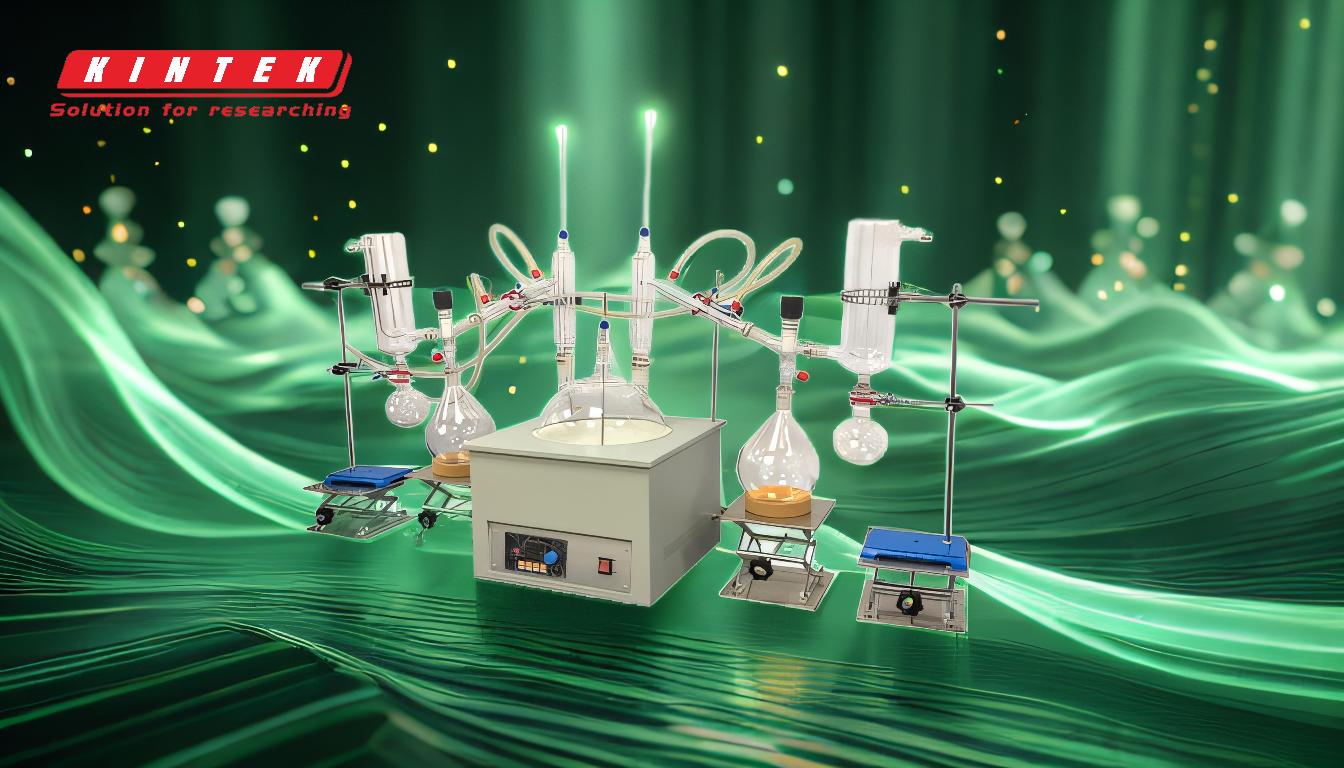Distillation is a process used to separate components of a mixture based on their different boiling points. A vacuum pump plays a critical role in this process by creating a low-pressure environment, which lowers the boiling points of the substances being distilled. This allows for distillation at lower temperatures, reducing the risk of thermal degradation, saving energy, and improving the efficiency of the separation process. Vacuum pumps are essential in various types of distillation, including wiped film distillation, short-path distillation, and other evaporative processes. They help maintain a consistent vacuum, facilitate the removal of gases, and ensure the purity of the extracted solvents. Additionally, vacuum pumps can be combined with other components like turbo molecular pumps, cold fingers, and condensers to optimize the distillation process further.
Key Points Explained:

-
Lowering Boiling Points:
- A vacuum pump reduces the pressure inside the distillation system, which in turn lowers the boiling points of the substances being distilled. This is particularly useful for separating heat-sensitive compounds that might degrade at higher temperatures.
- For example, in short-path distillation, the vacuum allows heavier molecules to evaporate at lower temperatures, making the process faster and more efficient.
-
Energy Efficiency:
- By lowering the boiling points, a vacuum pump reduces the amount of heat required for distillation. This not only saves energy but also minimizes the risk of overheating and damaging the materials.
- The reduced temperature requirement is especially beneficial in industrial settings where large volumes of materials are processed.
-
Preventing Oxidation:
- The vacuum environment created by the pump removes oxygen from the system, which helps prevent oxidation of the substances being distilled. This is crucial for preserving the quality and purity of sensitive materials, such as cannabis extracts or pharmaceutical compounds.
-
Facilitating Continuous Feed Systems:
- In some distillation setups, vacuum pumps help create a continuous feed system by maintaining a consistent vacuum. This ensures a steady flow of materials through the distillation apparatus, improving overall efficiency and throughput.
-
Enhancing Separation Efficiency:
- The vacuum gradient created by the pump helps draw vapors into the fractionating tube or condenser, where they can be separated more effectively. This is particularly important in processes like wiped film distillation, where precise separation of volatile compounds is required.
-
Integration with Other Components:
- Vacuum pumps are often used in conjunction with other equipment, such as turbo molecular pumps, cold fingers, and vacuum condensers. These components work together to maintain a high vacuum gradient and condense volatile molecules, ensuring optimal performance of the distillation process.
-
Manual and Automatic Control:
- The operation of vacuum pumps can be controlled manually or automatically using a vacuum controller. This allows for precise regulation of the vacuum pressure, which can help save resources and extend the lifespan of the pump.
-
Applications in Various Types of Distillation:
- Vacuum pumps are essential in different types of distillation, including:
- Short-Path Distillation: Used for separating high-boiling-point compounds with minimal thermal degradation.
- Wiped Film Distillation: Ideal for heat-sensitive materials, where a thin film of the substance is spread over a heated surface under vacuum.
- Rotary Evaporation: Commonly used in laboratories for solvent removal under reduced pressure.
- Vacuum pumps are essential in different types of distillation, including:
-
Maintaining Purity:
- By creating a sealed, low-pressure environment, vacuum pumps help maintain the purity of the extracted solvents and other compounds. This is particularly important in pharmaceutical and food industries where contamination must be minimized.
-
Extending Equipment Lifespan:
- Proper use of vacuum pumps, including regulated operation and integration with controllers, can help extend the lifespan of the equipment. This is achieved by reducing wear and tear associated with high-temperature operations and ensuring consistent performance.
In summary, vacuum pumps are indispensable in distillation processes, providing the necessary low-pressure environment to lower boiling points, enhance separation efficiency, and maintain the purity of the distilled products. Their integration with other components and the ability to control vacuum pressure manually or automatically further optimize the distillation process for various applications.
Summary Table:
| Key Role of Vacuum Pumps | Benefits |
|---|---|
| Lowering Boiling Points | Reduces thermal degradation, ideal for heat-sensitive compounds |
| Energy Efficiency | Saves energy by lowering required heat |
| Preventing Oxidation | Maintains purity by removing oxygen |
| Continuous Feed Systems | Ensures steady material flow for higher throughput |
| Enhancing Separation Efficiency | Improves precision in volatile compound separation |
| Integration with Components | Works with turbo molecular pumps, cold fingers, and condensers |
| Manual/Automatic Control | Allows precise vacuum pressure regulation |
| Applications | Short-path, wiped film, and rotary evaporation |
| Maintaining Purity | Essential for pharmaceutical and food industries |
| Extending Equipment Lifespan | Reduces wear and tear, ensuring consistent performance |
Ready to optimize your distillation process? Contact our experts today for tailored solutions!











